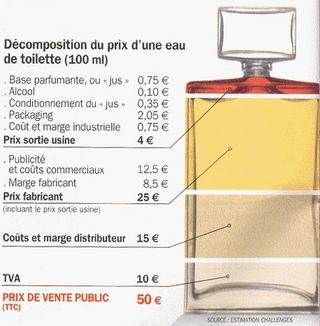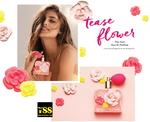Diagram: The Costs of Launching A New Perfume {Perfume History & Facts} {Scented Image}
On March 14 2006, the Committee on Competition condemned 13 fragrance and luxury brands (Chanel, Dior, Guerlain, L'Oréal, Yves Saint Laurent etc.) and three national distributors (Marionnaud, Sephora, and Nocibé) to an indemnity of 46, 2 millions of Euros for having agreed between 1997 and 2000 on recommended minimum retail prices in order to protect their luxury image. Smaller distributors were apparently forced to comply too. Both the commercial code and European legislation prohibit this type of practice. The magazine Challenges published a diagram that shows the average costs of launching a 100 ml eau de toilette in the mainstream market.......

Right out of the perfume factory, the scent in its packaging costs 4 Euros; the perfume base itself = 0.75 Euros. With advertisement (the biggest expenditure) and profit for the maker, one can add 25 Euros. Distribution costs and profit amount to 15 Euros. Sales tax = 10 Euros.
Sources: Toute en Parfum, Challenges










The jus is only 0.75 euros?! I always thought it costs roughly one third of the finished product.
Ok, can I go then straight to the factory with my own bottle (am having fun imaginining its size)? I wouldn't mind paying double the price ;-)
Wait! I don't want to lump advertising together with profit. I'm all for letting the perfumer make a profit, but I'd like to know how much they spend on advertising, and why I have to pay for that, too. And I can do without packaging. Perfumers note: smaller bottles, no cardboard boxes, and you can offer the jus at the price the jus deserves!
And this, my dear, is why I adore your blog! Once again a "BRAVA!" for braving the trade mags & sources to give us a peek at the inner economics and workings of the machine.
Now that's why I tend to buy only niche, vintage or extrait, and never scents that are advertised. I remember reading this info in Luca Turin's blog some time ago, and discussing it with the Serge Lutens people when his line was launched. I want to pay for what's in the bottle, not for the ads!
Dusan,
I don't know how they came up with the figures because I have not read the Challenges article. I knew that advertising and packaging weighed heavily in the mix.
Perphaps this model applies best to a perfume like a JLo perfume, which is not a pejorative example in my mouth.
Well, the jus costs that amount if it is produced on a very large scale so it cannot be dissociated from the distribution structure. Also, the figures don't take into account costs of investment and maintenance of a perfume house in general etc.
Still, it underlines the fact that the jus is not the most expensive element we get when we buy a perfume.
SniffQ,
This is a tricky question because we may not be aware how much our perception of a perfume is influenced by the stories and images surrounding it. If we accept the idea that the perfume industry is an industry that wants to make us dream like the movie industry, it seems difficult to do without those things that are external to the scent itself.
A jus has to be contained in a bottle. This very basic necessity already will condition our perception of the perfume. Imaginative people will want to offer variations of a simple basic bottle. Then, some other people will want to present the bottle of perfume well, in department stores and in pictures etc.
Actually many professionals recommend buying the smaller size bottles to minimize the chances of a perfume getting spoiled.
I think it's all a question of proportion. A no-no is when all the efforts go into the packaging and the perfume is neglected.
Fragrant Funster,
Thank you for your compliment. I am interested in all aspects of perfume creation and making.
I made some comments in my response to Dusan that I could have also written in my response to you.
CarmenCanada,
I am not principled like you. If I like a perfume, I will buy it independent of its context of origin.
The niche perfumeries are supposed to put more effort in their fragrances and less on advertisement and packaging. But I think actually that their packaging can be more luxurious than a prestige perfume one. I love beautiful bottles so as long as the jus does not smell cheaper than the bottle, I can appreciate the effort put in a nice flacon.
What do you make of the fact that Serge Lutens is turning towards advertising?
I think that niche perfumery means something to some extent, but I do not see it as the pure land of perfumery. For example, people from Serge Lutens do not hesitate to stress that their ingredients are "100% natural" which sounds to me like the myth of naturalness is important to them as long as they think it is important for the customers to hear that. What is meant by the term "natural" can be debated of course.
I am not aware that Luca Turin discussed this issue. If you have a link, we could maybe read about that discussion.
Re: Serge Lutens advertising... It's very recent and I suppose that the export line, in particular, needs to rake in money as the principle of the exclusives is not a very profitable business model. But I think the fact of having a uniform, simple packaging, as for Frédéric Malle, allows to invest more in ingredients. I'm not particularly for all-natural but the SL exclusives do seem to contain a higher proportion of them.
As for being disciplined, well, it's more a matter of having a small budget and restricting my purchases to the best possible quality-price ratio.
The Luca Turin article may have been either in NZZ Folio or his blog. I'll try to track it down today.
CarmenCanada,
I understand your reasoning. It can happen however that an edt version will work better for one than an edp or parfum versions.
The traditional prestige sector is full of fragrances that serve as reference points.
What is "natural" can be defined differently by different persons.
Having one kind of packaging certainly saves money.
It would be hard for me to discard The Dreamer edt by Versace, even after having taken a look at the numbers.
At the end of the day a fragrance must be a money maker for retailers or they wont stock it, advertising has a big part to play in that. I work for a fragrance company selling to the retailer, and whenever I discuss a new fragrance the first question the retailer asks is when, when and how much are you putting towards advertising, is there a gift with it and how many samples, testers, posters and staffing hours will you give me. There is a cost to all of that. Its very hard to get the retailer to stock a brand that has minimal support behind it. If a fragrance is diferent from the comman fruity floral fragrances they get very concerned that its too niche, and will rarley support it let alone buy it.The retailer rarely pays towards staffing to promote fragrance, as you can image its hard to make money in this industy that is now plaged with fakes, discounting, and the retailer demanding more and more from the supplier.The retailer charges for space in store to merchandise, and isnt really in for any other reason than to make money, they are not interested in telling to story etc.
Prestige has become mass. Fragrance can be bought anywhere and everywhere. Due to the parrallel market.Basically people are out to make money. Its very sad as the wow factor and theatre is now missing from what was once a beautiful business to work in.
Kaylene,
Thank you very much for your insights. When would you say it all started to change? (if you swing back by the blog).